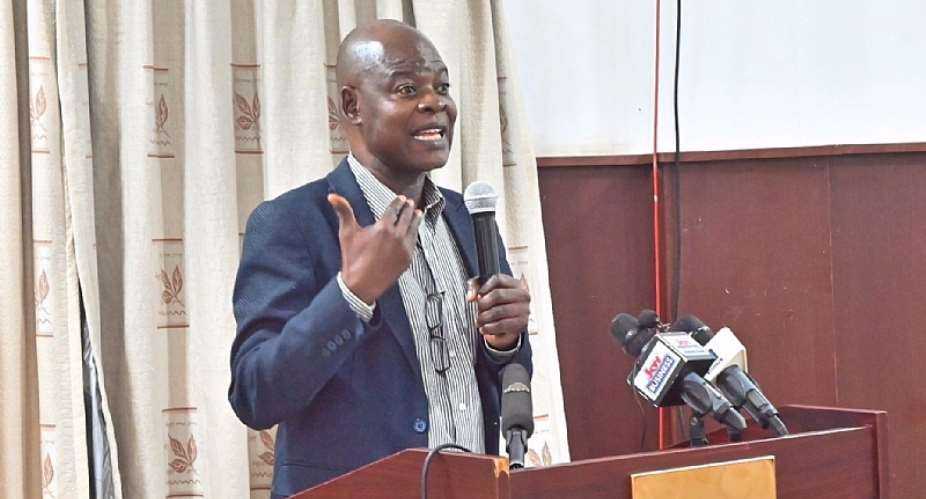
By Raymond Denteh
Agriculture remains the backbone of Ghana’s economy. Evidence indicates that it employs around 35–39% of the population and contributes more than 20% of the national GDP. Cocoa, maize, rice, poultry, horticultural crops, etc, sustain millions of households, especially in rural communities.
Yet, the sector faces long-standing challenges, including inadequate finance, unreliable input distribution, weak extension services, aging farmers, fragmented markets, and increasing vulnerability to climate change.
For decades, interventions to address these gaps have relied on subsidies, donor-funded projects, and state-driven mechanisation schemes. While helpful, these approaches have often been fragmented, short-lived, and unevenly distributed. The rise of Information and Communication Technology for Agriculture (ICT4Ag) offers a new pathway.
By leveraging mobile phones, digital platforms, data-driven services, and design-thinking innovation, ICT4Ag can connect farmers to finance, inputs, services, markets, and risk-mitigation tools, and mechanisation services in real time.
It represents an integrated, inclusive, and scalable approach that could redefine agriculture in Ghana from being subsistence-oriented to market-driven, resilient, and competitive.
With ICT4Ag, Ghana has a chance to leapfrog traditional bottlenecks and create a productive, resilient, and inclusive agricultural sector.
Access to Finance: Breaking the Collateral Barrier
Financing remains one of the toughest hurdles for Ghanaian farmers. Formal banks and microfinance institutions often view agriculture as too risky. Farmers are asked to provide land titles or fixed assets as collateral—resources that smallholders typically lack.
ICT4Ag is changing this reality. The digitisation of Village Savings and Loan Associations (VSLAs) and farmer groups enables members to maintain verifiable digital records of savings and loan repayments. These transaction histories create digital credit footprints, allowing banks and fintechs to assess repayment behaviour instead of relying solely on collateral.
Mobile money has already revolutionised commerce in Ghana’s urban centers. Its integration into rural savings groups is now extending this transformation by enabling access to microloans, digital wallets, and bundled financial products.
Through these platforms, financial institutions (FIs) and input dealers can increasingly provide credit facilities and input financing packages aligned with agricultural production cycles. When bundled with agricultural insurance, these products reduce risk for farmers and lenders, enhance productivity, and strengthen the resilience of farming households.
Equally important, ICT platforms are facilitating risk-sharing products, such as weather-index insurance, that make lending to smallholders less risky.
Access to Inputs and Services: Tackling Quality and Reach
Across Ghana, farmers face frequent shortages of genuine inputs such as certified seeds, fertilizers, agrochemicals—and limited access to mechanisation. Counterfeit inputs undermine yields, while limited mechanisation constrains expansion.
ICT4Ag platforms are tackling this by creating traceable, transparent supply chains. Farmers can now pre-order certified inputs through mobile platforms and deliver them via accredited agro-dealers. Mechanisation services such as tractors, planters, and threshers can be booked through apps, reducing idle capacity and ensuring farmers access equipment when needed.
This innovation reduces the exploitative role of middlemen who often inflate prices and peddle substandard goods. It also opens opportunities for youth-led agri-tech businesses to serve as last-mile service providers.
Market Linkages: Connecting Farmers to Fair Prices
For decades, Ghanaian farmers have sold at the farm gate to opportunistic traders, often at prices far below market value. This has entrenched cycles of low profitability and discouraged investment in improved practices.
Digital platforms are providing a solution. ICT4Ag applications are delivering real-time price information to farmers, reducing information asymmetry. Digital marketplaces now connect farmers directly to buyers—processors, retailers, and exporters—ensuring better prices and reducing post-harvest losses.
Logistics is another critical piece. Digital transport-matching services link farmers to truck owners at transparent rates, cutting post-harvest transport losses. In a country where food prices are heavily influenced by distribution inefficiencies, such solutions improve value chain competitiveness.
Risk Management: Building Confidence for Farmers and FIs
Agriculture is inherently risky; prices fluctuate, pests strike, and weather patterns are unpredictable. These risks discourage farmers from investing and FIs from lending.
ICT4Ag tools are providing new ways to measure, manage, and share risks. For instance, digital platforms link farmers to microinsurance products bundled with loans and inputs. Farmers can access credit-life insurance, livestock insurance, or input protection packages. In the event of loss, payouts prevent households from falling into poverty traps.
Farmers become more visible to insurers and FIs by building digital transaction trails. This transparency fosters confidence and unlocks more financing.
Climate Risk Management: From Survival to Resilience
Climate change is perhaps the single greatest threat to Ghana’s agriculture. Increasingly erratic rainfall, rising temperatures, and frequent droughts have already disrupted cocoa, maize, and rice production.
ICT4Ag is equipping farmers with the tools to adapt. Providers such as Ignitia deliver hyper-localized weather forecasts via SMS. These forecasts—accurate to within 3 km—allow farmers to plan planting, irrigation, and harvesting with greater precision. A cocoa farmer in Ashanti or a rice grower in Northern Ghana can now decide the best planting window, reducing losses from drought or floods.
Beyond forecasts, ICT platforms disseminate climate-smart practices such as mulching, intercropping, and drought-tolerant seeds. Over time, these practices build long-term resilience not just for farmers, but for entire rural economies.
Youth and Women: Leading new frontiers in the Future of ICT4Ag
The shift from traditional farming and ageing farmer populations has seen an uptake of youth participation in agriculture, and this is largely possible due to the integration of technology and ICT to modernize and mechanise agriculture. This developing trend creates a lot of opportunities for more young people and for women who stand to benefit at the centre of ICT4Ag adoption.
This is where opportunity meets with market need. Here’s why: Women comprise most of VSLAs’ membership and increasingly benefit from digital financial services that allow them to save, borrow, and insure without leaving their communities.
Meanwhile, young entrepreneurs are developing apps for farm management, post-harvest management, processing, value-addition, e-commerce and trading platforms for produce to market, and fintech solutions for farmers.
A strong example of this transformational journey is the work of the Kosmos Innovation Center (KIC), which has become a catalyst for youth-led agri-tech entrepreneurship. Since its inception in 2016, more than 58,425 young leaders have been trained in business skills, mindset change about agriculture and entrepreneurship through participation in KIC programs.
Through its flagship program the AgriTech Challenge, among others, KIC trains and mentors young innovators to design digital and technology solutions to agricultural problems—ranging from mobile apps that link farmers to tractor services (“Uber for tractors”), development of local tractors, hydroponic farming, food processing, innovations livestock health monitoring wearables, processing of bio fuel lubricants from agricultural raw materials, to circular economy innovations that enhance climate action through technology. Through KIC’s approach, winning start-ups receive seed funding and incubation support to scale their ideas into viable businesses.
In addition, to strengthen female participation in agriculture, KIC runs dedicated Women’s Bootcamps and Business Booster programs, equipping young women with entrepreneurial and digital skills to enable them to compete effectively in the agritech space.
These programs target women in urban, peri-urban, and rural communities, providing them with starter kits and access to finance at lower interest rates and supporting them to scale up. Over 20,000 young women have been trained, and 18,000 have been resourced through the Women’s Bootcamp.
KIC, in partnership with the Mastercard Foundation under the Initiative for Youth in Agricultural Transformation (I.Y.A.T.) program, is further scaling impact nationwide, working with 16 partnering academic institutions nationwide.
Through the US$16 million partnership, more than 53,973 young people have been put to work, with about 7,600 young entrepreneurs trained through KIC’s AgriTech Challenge and Incubation initiatives.
Across all KIC programs, the aim is to reach more than women 80% participants. Also, under the partnership,195,000 smallholder farmers have been supported with digital technology and market access solutions through KIC’s initiatives.
Notably, women-led or gender-focused start-ups emerging from KIC demonstrate the potential of gender-inclusive innovation. Farm Estates, which has a female co-founder in Adelaide N. Okpoti, is an automated closed-space and controlled urban farming solution that helps urban dwellers grow tomatoes organically in three-dimensional vertical racks.
Two of AgroCold Ghana’s co-founders are women (Jennifer N. Bonsu and Janice Nyardi). They provide an Internet of Things (ripening detector) and solar-powered cold storage facility to increase shelf life and marketability, and reduce post-harvest losses in the fruits and vegetables value chain in Ghana. Tracy A. Bawa leads BOOD, which uses a web-based platform to manage farmer data, weather monitoring tools, and an e-commerce site for farmer produce.
Start-ups like McHan Cosmetics, Aretha Forson Ltd, Kodu Technologies, Feeb Fibertech, Yarp Foods, are creating innovative solutions that are supporting farmers and also running sustainability programs that empower rural women farmers in their value chain to adapt and use some of these technologies.
Through these programs, KIC is proving that ICT4Ag is not just modernising farming, but also creating a new generation of youth and women agripreneurs who see agriculture as a business, not a last resort. Their innovations are unlocking opportunities across finance, inputs, and markets—helping Ghana build a more dynamic and inclusive agricultural future.
Challenges to ICT4Ag Adoption in Ghana
Despite its promise, ICT4Ag faces several hurdles that must be addressed for full-scale impact:
- Digital Literacy Gaps—Many smallholder farmers, especially the elderly, lack basic digital skills, making it difficult to use mobile platforms and apps fully.
- Connectivity and Infrastructure – Rural areas often experience poor internet coverage, unreliable electricity supply, and high data costs, limiting consistent access to ICT services.
- Trust and Awareness – Farmers may be sceptical of digital solutions, particularly financial products, due to fears of fraud or a lack of understanding of terms and benefits.
- Affordability – Smartphones, data bundles, and service fees remain costly for many smallholders, restricting access mainly to better-off farmers.
- Fragmented Platforms – Multiple ICT4Ag solutions operate in silos, leading to duplication, farmer fatigue, and a lack of interoperability.
- Regulatory and Policy Gaps – Slow regulatory frameworks and unclear data governance rules limit innovation, scale, and trust in digital agriculture.
- Limited Gender Sensitivity – Women farmers, though forming the bulk of VSLA members, often face barriers such as lower access to devices, cultural norms, and reduced mobility, which constrain adoption.
These challenges highlight that ICT4Ag, while transformative, requires enabling conditions to realise its full potential.
The Way Forward
ICT4Ag has demonstrated its potential in Ghana, but scaling requires deliberate action:
-
FIs such as Banks and microfinance institutions must embrace digital credit scoring.
• Insurance providers should innovate bundled products tailored for agribusinesses and farmers.
• Government and regulators must create enabling policies for agri-tech firms.
• Telcos and fintechs should expand affordable connectivity and mobile money infrastructure in rural areas.
• Donors and investors must support scaling successful pilots into nationwide programs.
The prize is significant! An agriculture sector that is more productive, resilient, and competitive, while reducing rural poverty and strengthening food security.
Conclusion
Ghana’s agriculture is at a turning point. ICT4Ag offers tools that directly address long-standing structural barriers in finance, inputs, services, markets, and climate resilience. The challenge now is to mainstream and scale these innovations across the country.
If stakeholders commit, ICT4Ag can unlock Ghana’s next agricultural revolution—transforming millions of smallholders into empowered agribusiness actors and securing prosperity for generations to come.
The writer is an Agribusiness Enthusiast
The post ICT4Ag: Unlocking agricultural transformation appeared first on The Business & Financial Times.
Read Full Story




















Facebook
Twitter
Pinterest
Instagram
Google+
YouTube
LinkedIn
RSS